Explore the Best AI Image Gallery

Quantum Computing Breakthroughs: Shaping the Future of Creativity and Ethics
Quantum computing represents a seismic shift in our technological landscape. Unlike traditional computing, which relies on bits as the smallest unit of data (0s and 1s), quantum computing utilizes quantum bits or qubits. This allows for processing information in ways that were previously unimaginable. As breakthroughs in quantum technology continue to proliferate, their implications stretch far beyond conventional computing applications, especially into the realms of creativity and ethical considerations.
The Impact of Quantum Computing on the Creative Industry
The impact of quantum computing on the creative industry is already beginning to manifest in various exciting ways:
- Enhanced Data Processing: Quantum computers can analyze vast datasets far more efficiently than traditional computers. This capability can be particularly useful for artists and designers who use data in their work, such as generative art or data visualization projects.
- Revolutionizing Design Processes: With quantum computing's ability to handle complex computations, designers may explore new realms of design possibilities. Quantum simulations could help visualize materials on a molecular level, leading to innovative products in fashion, architecture, and product design.
- Collaborative AI: Quantum computing enhances artificial intelligence algorithms, allowing them to make more nuanced decisions in creative processes. This could lead to AI-driven design tools that intuitively understand and respond to human creativity.
Potential Uses of Quantum Computing in Creativity
The potential applications for quantum computing in creative fields are vast:
- Film and Animation: Quantum simulators can generate complex simulations for visual effects in film, drastically reducing rendering times and enhancing realism.
- Music Composition: By utilizing quantum algorithms, music composition can be approached from a new perspective, potentially leading to entirely novel musical forms and structures that human composers might not consider.
- Game Development: Quantum computers can enable game developers to create rich, immersive narratives and environments that dynamically evolve based on player interactions, enhancing the overall gaming experience.
Ethical Considerations
As we embrace the phenomenal capabilities of quantum computing, we must also grapple with its ethical considerations:
- Intellectual Property: With AI and quantum computing poised to generate creative content, who owns the rights to such creations? Establishing legal frameworks that address copyright and intellectual property in this new age is crucial.
- Bias in AI Algorithms: If quantum computers are used to enhance AI that processes creative works, then the risks of embedding bias into those algorithms must be carefully managed. Ensuring diversity and representation in the datasets used to train AI systems is essential to promote inclusivity in creative outputs.
- Access to Technology: As quantum computing technologies develop, there needs to be equitable access to these resources. Without equal access, there's a risk that a divide may form, leading to disparities in who can leverage quantum advancements for creative expression.
Future Trends in Quantum Computing and Creativity
Looking ahead, several trends can be anticipated:
- Increased Interdisciplinary Collaboration: As quantum computing expertise grows, artistic fields will increasingly collaborate with scientists and technologists, resulting in innovative projects that blend art and science.
- Wealth of Creative Tools: Expect a surge of new tools that leverage quantum computing abilities, empowering artists to experiment with forms, styles, and methods previously deemed impossible.
- AI and Quantum Synergy: The combo of AI and quantum computing could revolutionize creative workflows, enabling artists to enhance their ideas and processes significantly.
In conclusion, while quantum computing promises an exciting future for creativity, it compels us to examine the ethical ramifications that accompany such unprecedented advancements. Maintaining a balance between innovation and ethical decision-making will be paramount as we navigate this new era of technological development. The intersection of quantum computing and creativity not only opens new frontiers in artistic expression but also challenges us to think critically about the direction and implications of these advancements.
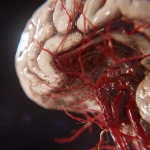
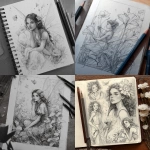

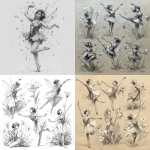










](https://images.ai-img.art/thumbnails/150/915b5e50ce61f6219cb8f764d89e2efcb8ad3a9ebd09e0670ae7dc0e2c99a8bd.webp)




](https://images.ai-img.art/thumbnails/150/da89993919887fcf2c84af5ec12f2ac997ad0f67c8bf00fecd67ba06a1b3dc49.webp)







](https://images.ai-img.art/thumbnails/150/476665d1452e44d38d5b4fbf5fab4389a6131d55b7bfe8a41d7f65f66b5a9310.webp)


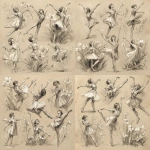





](https://images.ai-img.art/thumbnails/150/aed4d771a0a5b63bed28f6e7183dd4614c5e3e3586d300c8d879ccbb37dbfb4e.webp)





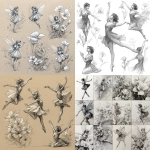
](https://images.ai-img.art/thumbnails/150/cf8299cc184c859eff89d17514689e19c7994ad29256a58ad77fa0f7218e2cff.webp)
](https://images.ai-img.art/thumbnails/150/78b567a3483191dd52f3d16038b5a926e03e4066d5b301cfff023fb91a962e67.webp)




